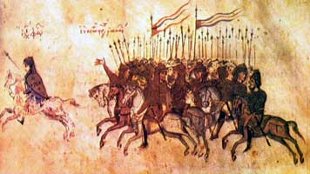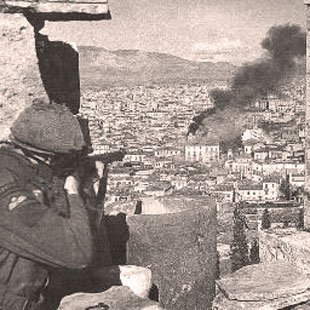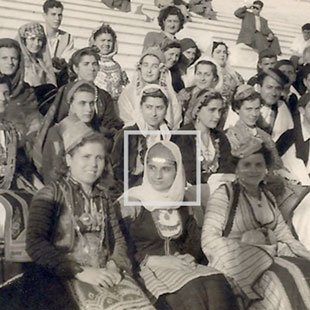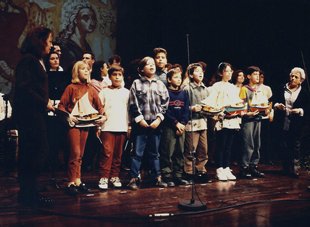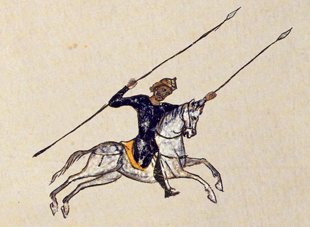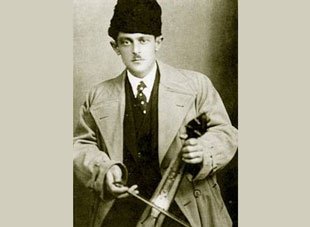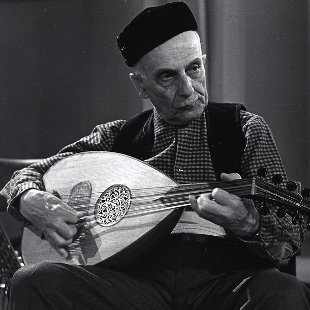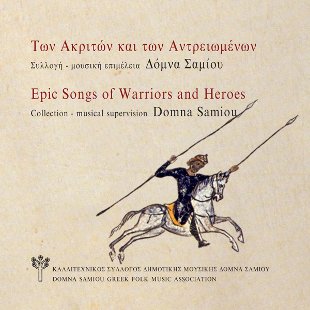You are at: Home page Her Work List of Songs A Widow Bore a Child
The Song of Porphyris
Χήρα-ν παιδίν εγέννησε
Listen
Lyrics
A widow bore a child and called him Prosfylis,
she bore him behind bars, she suckled him in a prison.
Aged one, he took up a sword, aged two his spear,
at three and four he leapt upon his mount,
he leapt upon his mount and took to the road.
And when the king got word of it,
it weighed most heavily upon him.
- Summon my bodyguard and my courtiers all,
let everyone who has broken bread with me get off to Porfylis.
[When word reached Porfylis, a shepherd he became
who took his herd out to graze and graze some more.
And the Saracens appeared like the stars, like the leaves on a tree.
The stars have a number, the leaves can be counted
but the Saracens were numberless, they could not be counted.
They all came, all of them passed by.
A blind cripple left behind marched by, a one-armed man at his side.
- Hey, lamb-herd, have you seen Porphyris?
- Which Porphyris is it that you seek?
- The widow's son, the grandson of the wilderness.
- I'm the widow's son, it's me you seek.
They lifted their voices and yelled, they yelled with all their might.
Those in front turned tail, those at the back stood their ground,
and those in between stood and wondered.
They bound him twice and thrice, and twice clapped him in irons.
- Take me to any castle you will, but not to Dikia,
I've a maid most fair in Dikia, and she'll weep at the sight of me.
They turned their back on every castle, and took him straight to Dikia.
And the fair maid came out to look upon him from on high.
- Porphyris, where is all you said? Porphyris, where is all you bragged about?
- Hush, fair maid, don't you cry, save your tears.
Once I cross mountains and valleys
I'll send word to you in the language of the birds.
They strode over mountains and over valleys,
and all the ropes snapped, became swords and lances.
He killed all the Turks, leaving just the blind man,
the blind cripple and the one-armed man.
- Go and tell the king, go tell the great king,
that if he has more cabbages, let him bring them on,
the pot is half empty and I don't yet have enough to cook.]
Translated by Michael Eleftheriou
Original Lyrics
Χήρα-ν παιδίν εγέννησε
Του Πορφύρη
Χήρα-ν παιδίν εγέννησε και λεν τονε Προσφύλη,
στα σίδερα τον γέννησε, στη φυλακή τον θρέβει.
Χρονιάρης πιάνει το σπαθί, στα δύο το κλοντάρι1,
στα τρία και στα τέσσερα πηνέβ'2 καβαλικεύει.
Πήνεψε, καβαλίκεψε, 'κατό δρόμους πηγαίνει.
Κι ως τ' άκουσε κι ο βασιλιός, πολύ τονε βαριώθη3.
- Ας σωρευτεί τ' αλλάγια4 μου, κι όλο προαλλαγιά μου
όποιος τρώγει το [γ]έμα μου5 στον Πορφυλή να πάει.
[Ως τ' άκουσε κι ο Πορφυλής αρνιοβοσκός και βγήκε,
βόσκει τα, παραβόσκει τα, 'κατό δρόμους τα βγάζει.
Φανήκαν οι Σαρακηνοί σαν τ' άστρα, σαν τα φύλλα.
Τα άστρα έχουν μέτρωση, τα φύλλα έχουν ψήφους6
κι εκείνοι μέτρο δεν εχούν7 και ψήφο δεν ψηφιένται.
Ούλ' ήρταν, ούλοι πέρασαν κι ούλ' ήρταν, ούλοι διάβαν,
'πόμνειν' γ-εις τυφλός κουτσός και γ-εις μονοχεράκης.
- Να μη σε πούμ' αρνιοβοσκό, εδά Πορφύρην είδες;
- Το ποιο Πορφύρην αραεύτ', το ποιο Πορφύρη γ'ρεύητ';
- Εκειό της χήρας τον υιό, της Σαραμιάς το 'γγόνι8.
- Χήρας ο υιός εγώ είμαι, το γ'ρεύητε εγώ 'μαι.
Δώκαν φωνή και φώναξαν, ό,τι φωνή κι αν είχαν.
Τα ήσαν μπρος γυρίστανε, τα ήσαν πίσω στάθαν,
τα ήσαν σην αναμεσαριά στάθαν κι αναρωτιένται.
Διπλόν τριπλόν τον έδεσαν, διπλόν τον σιδερώνουν.
- Βούλα9 τα κάστρα πάτε με, στη Δίκια μη με πάτε,
στη Δίκια 'χω ξαθή κορη, θωρεί με και δακρυούται.
Βούλα τα κάστρ' αφήκανε, στη Δίκια τον παγαίνουν.
Ξέβηκε κι η ξαθή κορη ας τα ψηλά κοιτάζει.
- Πορφύρη, πού 'ν' τα ήλεγες, Πορφύρ' πού 'ν' τα καυκίστεις;
- Σώπα, σώπα ξαθή κορη, μη κλαις και μη δακρυούσαι.
Όσο ν' αστήσω10 τα βουινά, τα μεσακά κοιλάδια,
χαπάριτσι σε στέλνω 'γώ με του πουλιού τη γλώσσα.
Διαβήκαν τα ψηλά βουινά, τα μεσακά κοιλάδια,
όλα τα σκοινιά 'κόπανε, 'γέναν σπαθιά, κοντάρια.
Όλους τους Τούρκους σκότωσε και το τυφλό αφήκεν,
αφήκεν το τυφλό κουτσό και το μονοχεράκι.
- Αμέτ' ειπέτ' το βασιλιά, το μέγα βασιλέα,
αν έχει κι άλλα λάχανα, ας τα στείλει, ας έρτουν,
τούτ' μαγειριά δεν έγιναν, μαγειρ'κό δεν γιομώσαν.]
1κλοντάρι: κοντάρι
2πηνέβ’: πηδάει
3βαριώθη: του φάνηκε βαρύ, του κακοφάνηκε
4αλλάγια: τμήμα στρατού στην υπηρεσία του βασιλιά, η βασιλική σωματοφυλακή
5γέμα: γεύμα. Όποιος μοιράζεται το τραπέζι μου και άρα συνδέεται μαζί μου με τους ιερούς δεσμούς της φιλοξενίας.
6τα άστρα μετριούνται, τα φύλλα λογαριάζονται. «Ψήφος» με την αρχαία σημασία: πετραδάκι που το χρησιμοποιούσαν για την αρίθμηση, μετρητής• ψήφοις λογίζεσθαι = υπολογίζω χρησιμοποιώντας πετραδάκια
7εχουν: Πολλές λέξεις παρουσιάζονται στο κείμενο παρατονισμένες. Αυτό συμβαίνει όταν η μελωδία, ακολουθώντας το ισχυρό του ρυθμού, τονίζει τη λέξη σε άλλη συλλαβή από την κανονική της ομιλίας, προσαρμόζοντάς τη στα μέτρα του μέλους
8της Σαραμιάς το ΄γγόνι: Πρόκειται για παραφθορά της στερεότυπης έκφρασης «της ερημιάς το εγγόνι». Φαινόμενο συχνό: όταν λησμονιέται το αρχικό νόημα ενός τραγουδιού, μιας έκφρασης, μιας λέξης, ο τραγουδιστής, φροντίζοντας μόνο να ταιριάζει στο μουσικό μέτρο, προσαρμόζει, διασκευάζει, «μεταφράζει», «λειαίνει» προσπαθώντας να κάνει στίχους και περιστατικά κατανοητά και αποδεκτά, αδιαφορώντας για το παλαιό νόημα των λόγων
9βούλα: σε όλα
10αστήσω: πιθανόν από την τουρκική λέξη aşmak = υπερπηδώ, διασκελίζω, περνώ
Information
- Region: Cappadocia / Konya
- Area: Anakou
- Categories: Acritic Song
- Rhythm: 4 beats
- Duration: 03:27
Collaborators
- Singer: Domna Samiou
- Oud: Petros Athanasopoulos-Kalyvas
- Lute: Mathios Ventouris
Albums
Recording information
Recorded at a concert in Saint Denis, Paris, in 1982.
The version Domna sings is based on the original recording made in 1930 by Melpo Merlier for the Musical Folklore Archives at the Centre for Asia Minor Studies. The song was sung on that occasion by Maria Tourgouti, who was born in 1882 in Anakou in the Prokopi region of Cappadocia. The additional verses, which aren't sung, are from a contemporary written account in the Hellenic Folklore Research Centre Archive (ΚΕΕΛ) provided by Christos N. Tourgoutis, also from Anakou, Cappadocia (ΚΕΕΛ, no. 228_8_5). Miranda Terzopoulou (2017)
Member Comments
Post a comment
See also
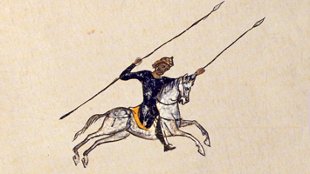
Song
A Nun With Child
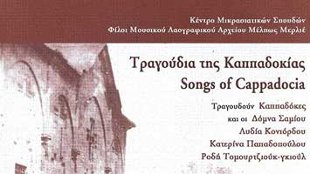

Song
By Command of the King
